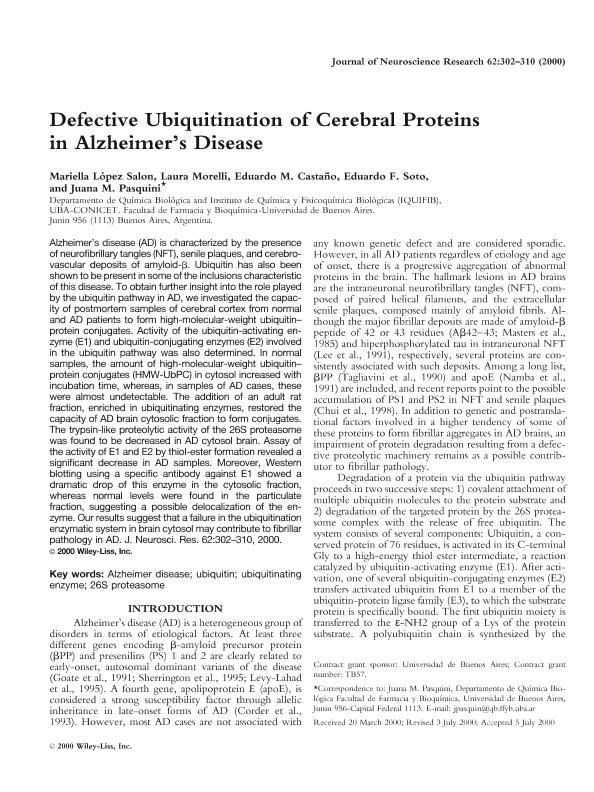Artículo
Defective ubiquitination of cerebral proteins in Alzheimer's disease
Lopez Salon, Mariella; Morelli, Laura ; Castaño, Eduardo Miguel
; Castaño, Eduardo Miguel ; Soto, Eduardo Francisco
; Soto, Eduardo Francisco ; Pasquini, Juana Maria
; Pasquini, Juana Maria
 ; Castaño, Eduardo Miguel
; Castaño, Eduardo Miguel ; Soto, Eduardo Francisco
; Soto, Eduardo Francisco ; Pasquini, Juana Maria
; Pasquini, Juana Maria
Fecha de publicación:
10/2000
Editorial:
Wiley-liss, Div John Wiley & Sons Inc
Revista:
Journal of Neuroscience Research
ISSN:
0360-4012
e-ISSN:
1097-4547
Idioma:
Inglés
Tipo de recurso:
Artículo publicado
Clasificación temática:
Resumen
Alzheimer's disease (AD) is characterized by the presence of neurofibrillary tangles (NFT), senile plaques, and cerebrovascular deposits of amyloid-beta. Ubiquitin has also been shown to be present in some of the inclusions characteristic of this disease. To obtain further insight into the role played by the ubiquitin pathway in AD, we investigated the capacity of postmortem samples of cerebral cortex from normal and AD patients to form high-molecular-weight ubiquitin-protein conjugates. Activity of the ubiquitin-activating enzyme (E1) and ubiquitin-conjugating enzymes (E2) involved in the ubiquitin pathway was also determined. In normal samples, the amount of high-molecular-weight ubiquitin-protein conjugates (HMW-UbPC) in cytosol increased with incubation time, whereas, in samples of AD cases, these were almost undetectable. The addition of an adult rat fraction, enriched in ubiquitinating enzymes, restored the capacity of AD brain cytosolic fraction to form conjugates. The trypsin-like proteolytic activity of the 26S proteasome was found to be decreased in AD cytosol brain. Assay of the activity of E1 and E2 by thiol-ester formation revealed a significant decrease in AD samples. Moreover, Western blotting using a specific antibody against E1 showed a dramatic drop of this enzyme in the cytosolic fraction, whereas normal levels were found in the particulate fraction, suggesting a possible delocalization of the enzyme. Our results suggest that a failure in the ubiquitination enzymatic system in brain cytosol may contribute to fibrillar pathology in AD.
Palabras clave:
Uniquitina
,
Alzheimer
,
Enzimas
,
Proteosomas
Archivos asociados
Licencia
Identificadores
Colecciones
Articulos(IIBBA)
Articulos de INST.DE INVEST.BIOQUIMICAS DE BS.AS(I)
Articulos de INST.DE INVEST.BIOQUIMICAS DE BS.AS(I)
Citación
Lopez Salon, Mariella; Morelli, Laura; Castaño, Eduardo Miguel; Soto, Eduardo Francisco; Pasquini, Juana Maria; Defective ubiquitination of cerebral proteins in Alzheimer's disease; Wiley-liss, Div John Wiley & Sons Inc; Journal of Neuroscience Research; 62; 2; 10-2000; 302-310
Compartir
Altmétricas



